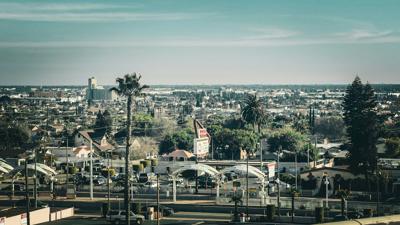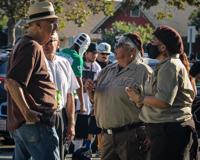
East Los Angeles is considered to be the largest unincorporated area in population within L.A. County, home to approximately 120,000 people. Photo by Oscar Ochoa
East Los Angeles, the predominantly Latino community known for its artistic murals, the Chicano movement of the late 1960s and early 1970s, political and social activism and the prevalent cultural ambiance, could soon become its own city.
And as of today, East L.A. remains an unincorporated community in Los Angeles County. What is an incorporated community, you may ask?
Los Angeles County covers 4,000 square miles and within the county, there are 88 incorporated cities, each with its own city council. But there are also areas within the county that are not part of any official city. These are considered “unincorporated” communities.
According to L.A. County, more than 65 percent of the county is unincorporated and over 1 million people live in these areas. L.A. County provides municipal services for these communities, such as law enforcement, firefighting, animal control, trash collection, road maintenance and library services, among others. For these communities, the L.A. Board of Supervisors acts as their “city council,” and the supervisor representing the area is considered their “mayor.”
Many unincorporated areas are as small as a few blocks, and some are much larger than many already-incorporated cities. East Los Angeles is considered to be the largest unincorporated area within L.A. County, home to approximately 120,000 people.
In April, Assemblywoman Wendy Carrillo, representing East L.A. at California’s 52nd Assembly District, introduced AB 2986, a proposed bill that looks to study the economic sustainability of East L.A. via a task force to determine if the community can become its own city or “special district.”
If approved, the bill’s language states that the Local Agency Formation Commission for the County of Los Angeles (LAFCO) would need to create an 11-member Special Task Force with consultation from the East L.A. community. The Task Force would be in charge of studying and evaluating the state and county resources designated and given to the East L.A. community, as well as looking into the economic and social development that could facilitate the opportunity for East L.A. to become its own city. The task force would provide an analysis of both the advantages and disadvantages of this becoming a reality.
Carrillo said that, contrary to popular belief, the bill does not ask residents to support or oppose the creation of a city today, but simply to support an analysis that would give transparency on how tax money is spent in East L.A.
“AB 2986 is simply a feasibility study that would allow East L.A. residents to have transparency in government by knowing where and how their tax dollars are being spent. For decades, East L.A. residents have been told they are ‘too poor and have no tax base.’ Since LAFCO denied the last incorporation effort in 2012, we now ask the question, what has been done since?” Carrillo said.
She adds, “To clear many misunderstandings about the policy, AB 2986 does not mandate cityhood for East L.A., does not increase taxes nor does it change any of the current structure or county support for residents; it simply asks for transparency in government by allowing a study to move forward. Residents of East L.A. deserve transparency and accountability as to how their tax dollars are being spent and how they can be more involved and engaged in infrastructure projects, economic and workforce development, small businesses improvement and overall better the delivery of county services. If surrounding cities have local representation, why can’t East L.A.?”
This is not the first time East L.A. residents have been asked to contemplate the possibility of East L.A. becoming its own city.
Efforts have also been made in previous years, all of which have failed. The latest attempt was more than a decade ago, in 2012, when LAFCO declared East L.A.’s inability to do so, citing financial unaffordability as the reason, meaning the proposed city did not generate sufficient tax revenue to sustain cityhood. “The City of East L.A. would not be able to sustain itself past the first three years of incorporation,” the report stated.
Prior to that, the debate also arose in 1931, 1933, 1961, 1963 and 1975.
Many residents wonder if that is still the case or if East L.A. could financially support becoming its own city. Supervisor Hilda L. Solis, who has represented East L.A. on the Board of Supervisors for nine years, says it can't.
The big division among those supporting or opposing the bill is reflective of the difference in opinion between the two officials who oversee and represent East L.A. in different branches of the governments: Assemblymember Carrillo and Supervisor Solis.
On April 23, the Los Angeles County Board of Supervisors unanimously approved a motion authored by Solis to publicly oppose AB 2986. Solis's office said East L.A. relies on Los Angeles County’s safety net resources and this bill refrains from that by putting the community in the hands of “special interests.” The office also said the task force would be made up of stakeholders who “aim to drown out the voices of residents,” posing a significant risk of gentrification and displacement in the area.
“A false narrative has been established by the bill’s author implying that East Los Angeles is without local representation and that incorporation would benefit residents, and that is simply not the case,” Solis said. “By steadfastly opposing A.B. 2986, we demonstrate our unwavering dedication to preserving this culturally vibrant community.”
Solis' office also stated incorporation would hurt residents as they would have to pay more for things like law enforcement, fire services, libraries, housing, parks and animal control, among other services.
Last Friday, East Los Tacos, a family-owned business on Cesar Chavez Avenue, opened its doors to a community town hall organized by Carrillo, who invited residents to receive information about AB 2986. Approximately 150 people attended the informational community meeting, some opposing the bill, others supporting it and a large number interested in learning more about it.
“We want to see local representation,” Carrillo said.
She added that if East L.A. had a special district, the residents would have representatives at the local level involved with infrastructure development, new housing, new projects, economic development and workplace development, all things needed to better improve the lives of people.
“As residents of an unincorporated area, we have no mayor, city council, or governing board, and our most ‘local’ elected official is our L.A. County Board Supervisor, who represents two million people,” said Kristie Hernandez, Chair of the Maravilla Community Advisory Committee in East Los Angeles. “Even with the supervisor doing their best, it's a large district to cover. Our community is made up of nearly 120,000 residents. East L.A. lacks a local voice solely representing our community’s interests, needs and priorities. Without a governing body or any elected representative, we will continue to be excluded from critical decisions over county ordinances, including those related to housing and transportation, planning and economic development.”
The motion approved by the Board of Supervisors in opposition to AB2986 offered a county-led study, different from that of Carrillo's, which would essentially identify the county’s investments in East L.A. and an analysis of the community's financial viability to stand alone as a city. The report would be conducted in four months or 120 days. Carrillo said this might not be enough time to get an accurate financial study for the community.
Many of the residents supporting this bill argue that if other communities like Pico Rivera and South Gate, which are relatively smaller than East L.A., have local representatives, mayors and city council representatives, it is time for the largest unincorporated area of L.A. to have one, too.











(0) comments
Welcome to the discussion.
Log In
Keep it Clean. Please avoid obscene, vulgar, lewd, racist or sexually-oriented language.
PLEASE TURN OFF YOUR CAPS LOCK.
Don't Threaten. Threats of harming another person will not be tolerated.
Be Truthful. Don't knowingly lie about anyone or anything.
Be Nice. No racism, sexism or any sort of -ism that is degrading to another person.
Be Proactive. Use the 'Report' link on each comment to let us know of abusive posts.
Share with Us. We'd love to hear eyewitness accounts, the history behind an article.